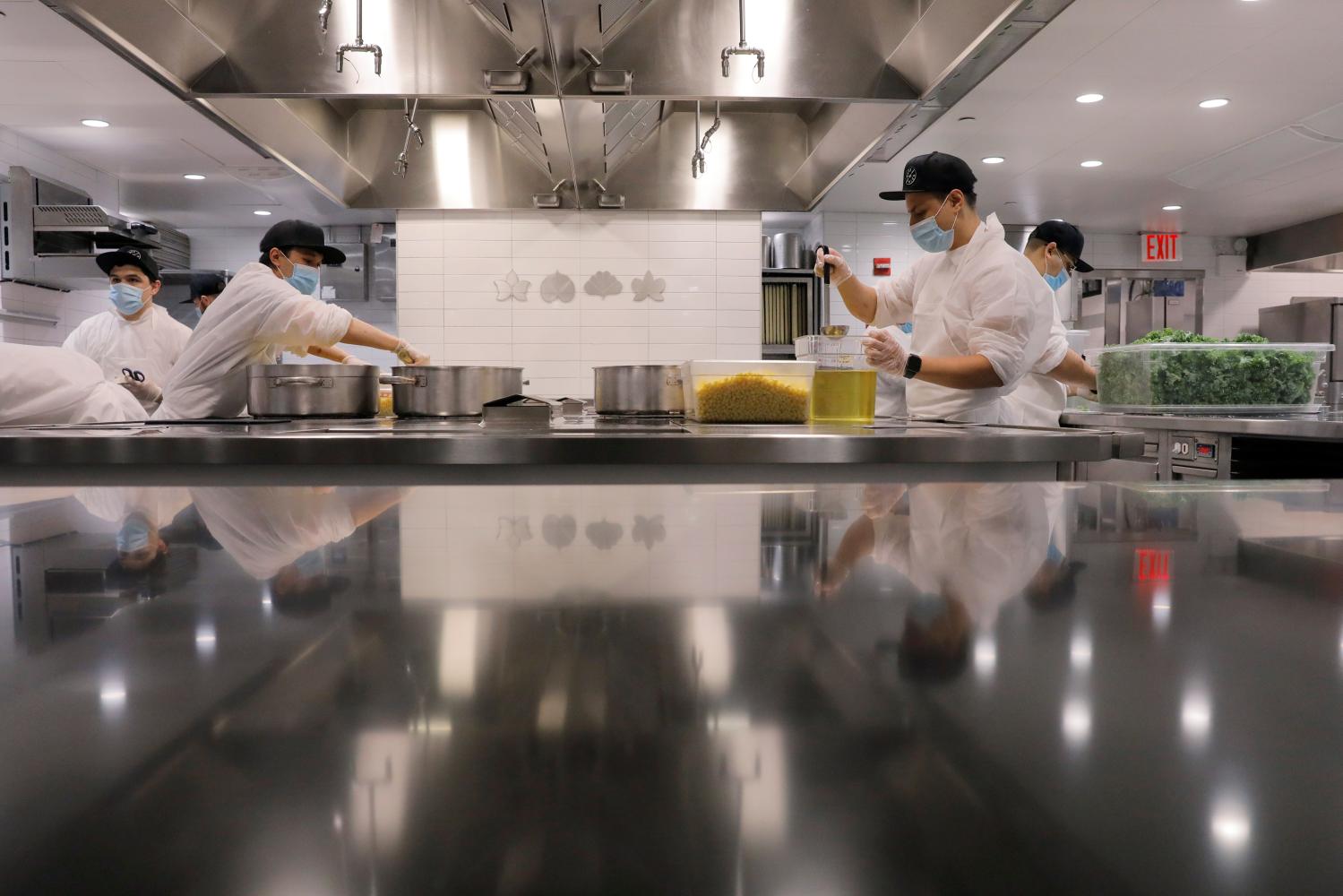This case study is part of the Spotlight on Local Recovery Efforts series, a feature of the COVID-19 Metro Recovery Watch.
Summary
When the COVID-19 pandemic and the subsequent economic shutdown took place, restaurant workers were among the most vulnerable to mass layoffs and furloughs. Independent restaurants, a great deal of which are small businesses, felt the severe impact of COVID-19 when consumers began staying home. Meanwhile, food banks had difficulty keeping up with demand as millions of families struggled to afford food.
California launched High Road Kitchens to address the idle status of restaurants and the tremendous need for food relief at the same time. Using grants and subsidies, High Road Kitchens incentivizes independent restaurants to reactivate their businesses as meal providers for hunger relief. The first of its kind, High Road Kitchens launched on April 24th in San Diego. Since that time, these restaurants have expanded to San Jose, Monterey, Los Angeles, Sacramento, Oakland, San Francisco, and New York City. They are working toward expanding further, to Detroit, Boston, Illinois, Pennsylvania, and Washington, D.C.
By putting recovery hand in hand with a long-term commitment to improved employer practices, High Road Kitchens is making better-quality jobs in the restaurant industry more appealing to owners and more realistic for service workers.
Execution
High Road Kitchens is a collaborative effort started by the One Fair Wage coalition and its network of restaurant industry leaders and employers, Restaurants Advancing Industry Standards in Employment (RAISE). In partnership with The Cooking Project and advised by the founder of DC Central Kitchen, Robert Egger, One Fair Wage launched High Road Kitchens seven weeks after Governor Gavin Newsom ordered California restaurants to close for social distancing. The “high road” in the name refers to achieving profitability while also providing quality jobs.
Restaurants that are interested in receiving funding support to reopen early (potentially with wage subsidies) can apply to become a High Road Kitchen on the website. In the application, restaurants must disclose staff demographics, staff pay before COVID-19, and planned staff pay when reopening. Participating restaurants must join the RAISE network and sign an agreement committing to use the funding to rehire workers, reopen with pick-up and delivery options, and provide free meals to health care workers and those in need, while also selling food on a sliding scale to paying customers. The goal is for paying customers to subsidize the free meals so that the model can become self-sustaining. In addition, participating restaurants commit to paying a full, fair minimum wage for all workers, including tipped workers, as well as increasing race and gender equity in their workplace over the next five years. Owners must also attend a race and gender equity program over several weeks, adopted from a model initially created by Race Forward and One Fair Wage.
Once restaurants in participating cities apply, sign their agreement, and get approved, they receive an estimated $18,000 to $25,000 in grant money. High Road Kitchens typically provides participating restaurants with an initial $5,000 to cover food and packaging, and local private sector and/or government support makes up the remaining funds offered to each restaurant for labor subsidies and other startup costs. In places where High Road Kitchens has a partnership with the local workforce development board, restaurants receive wage subsidies through them as reimbursements. In places where High Road Kitchens does not currently have local private sector and/or government support, community members can adopt a restaurant and fundraise enough to cover labor subsidies and any other reopening costs not covered by the initial $5,000. Once restaurants begin serving meals, High Road Kitchens checks in regularly to offer support and guidance, and schedule the race and gender equity program.
Cost and timeframe
In California, some of the High Road Kitchens partners include the state of California, the city of San Francisco, the city of San Jose, the city of Sacramento, the workforce investment boards of San Diego and Monterey, the Walter & Elise Haas Fund, the San Francisco Foundation, DMB Enterprises, the Hewlett Foundation, and the Robert Wood Johnson Foundation. In San Diego, the pilot city for the program, the San Diego Workforce Partnership contributed $150,000 for phase one of the project, and the San Diego Foundation contributed $110,000. The initiative also recently expanded to New York City, where the mayor allotted $2 million of mayoral discretionary funding for the program. Support from workforce boards for employment subsidies usually comes from federal Workforce Innovation and Opportunity Act (WIOA) dollars that are administered by local workforce development boards.
Key components and features
High Road Kitchens provides meals to health care workers and people experiencing food insecurity. The program utilizes the community kitchen model to recover lost service industry jobs, keep small businesses open, and use restaurants to build a more resilient food supply chain. High Road Kitchens addresses three key issues:
- Feed people who are food insecure: Restaurants provide free meals to low-wage workers, health care workers, and others in need. They serve pick-up and delivery food on a sliding scale to paying customers to subsidize the free meals.
- Bring people back to work: Restaurants rehire and employ service workers.
- Support and highlight restaurants that agree to take the high road to profitability: Restaurants must participate in a race and gender equity program that consists of a restaurant self-assessment and hiring assessment to determine if there are race and gender inequities regarding pay, staff hierarchy, and implicit bias. The program also works with restaurants to form a yearlong strategy and implementation plan to transform restaurants into more equitable workplaces. In addition to this, restaurants must commit to providing wages higher than the industry standard and increased race and gender equity over the next five years.
Successes
As an emergency response with a quick turnaround time, High Road Kitchens impressively convened the public, private, and nonprofit sectors for a unique collaboration that produced an innovative, multidimensional program. The response is far from shortsighted, and aims to not only recover California’s restaurant industry, but also improve it from its pre-COVID-19 state by addressing issues such as poor job quality.
Considerations
For the workers of participating restaurants, the transition to becoming part of High Road Kitchens hasn’t always been seamless. Marketing free food to people who need it is not work that restaurants typically do; many participating restaurants learned that they had to do their own outreach to nearby places such as senior homes and public housing developments. Rehiring staff who don’t feel safe returning to work during a pandemic can also be challenging. In addition, undocumented workers can’t get paid through federal WIOA funds, which excludes them from rehiring pools.
While fitting for California’s thriving cities, High Road Kitchens may not be able to be successfully duplicated in smaller places that do not have the benefit of several major employers nearby. If the surrounding community cannot afford to pay for food at participating restaurants due to high unemployment, then there will not be enough money to subsidize the free meals of those in need, and the program cannot work. This obstacle sheds light on how places with more middle- and upper-class residents will likely recover faster from the economic consequences of the COVID-19 shutdown.
As a resource to those in need, the program would be even more inclusive if it required food that accommodates special dietary needs at every participating restaurant, especially considering that the number of High Road Kitchens in each city is limited. Research has shown that people living in or near poverty have disproportionately worse health outcomes; taking this action would help to ensure that fewer people feel the need to choose between what they can afford to eat and what fits their diet.
Sources and additional resources:
- High Road Kitchens: website
- High Road Kitchens: video
- The California Labor & Workforce Development Agency press release: California Labor Secretary announces groundbreaking public-private partnerships to support employers & workers in restaurant & hotel industries impacted by COVID-19
- San Diego Foundation press release: San Diego Workforce Partnership, the San Diego Foundation and local restaurants launch program providing at least 7,500 free meals and rehiring laid-off workersv
- San Diego Workforce Partnership press release: Amidst pandemic, San Diego restaurants feed frontline workers and commit to job quality
- One Fair Wage: website
- RAISE: website
- Roadmap to Reimagine Restaurants: A New Path Forward after COVID-19
- The Cooking Project: website
- About Robert Egger
- DC Central Kitchen: website
- Food Research & Action Center: The Impact of Poverty, Food Insecurity, and Poor Nutrition on Health and Well-Being
Do you have a similar solution in your area? Is there another problem that you’re tackling in an innovative way that you’d like to share with a wider audience? Contact us at [email protected].






